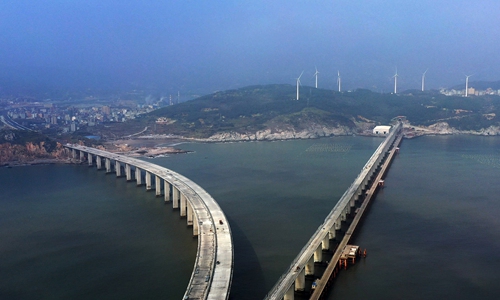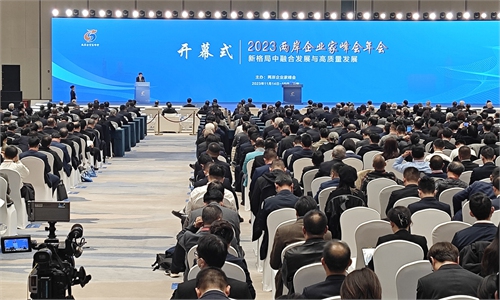
A view of the cross-Straits railroad bridge that links Fuzhou, capital of East China's Fujian Province, with Fujian's Pingtan county Photo: cnsphotos
Businesses from Taiwan island remain highly optimistic about the promising development opportunities in the Chinese mainland market and are committed to continuing their investments in the region, despite the tense cross-Straits relations, Lai Cheng-i, chairman of the General Chamber of Commerce of the Taiwan island, told the Global Times on Tuesday.
The remarks were made at the 2023 Cross-Straits CEO Summit held in Nanjing, East China's Jiangsu Province from Tuesday to Wednesday, an annual conference for entrepreneurs from both sides of the Straits that is marking its 10th anniversary this year.
The event has served as a key platform for businesses to explore collaborative opportunities by aligning with the trend of cooperation and connectivity, and more events like this should take place, Lai noted, as a person who has attended the event for many years.
The business group's representative also highlighted the importance of making sure that cooperation on both sides of the Straits can get closer and not be disrupted.
Taiwan island's economy is export-oriented, with the mainland market being its most important trading destination. Data released by the General Administration of Customs shows that total cross-Straits trade in 2022 amounted to $319.678 billion. Of this, the mainland imported $238.092 billion worth of goods from Taiwan and exported $81.587 billion worth of goods to the island. This suggests that the Taiwan region had a trade surplus with the mainland of over $150 billion.
"If we exclude this surplus, Taiwan would have a serious deficit. One can imagine the impact this would have on Taiwan's economy," Lai said.
Given this strong connectivity, Lai said that the economic interactions between the two sides of the Taiwan Straits are crucial.
Regarding the resumption of direct flights between the two sides, Lai said that it is the Taiwan entrepreneurs' expectations that more direct flights can be resumed.
"The inadequate number of direct flights at the moment has caused significant inconvenience to businesses from Taiwan, and we have been in constant communication about this issue on both sides," Lai said.

Lai Cheng-i, chairman of the General Chamber of Commerce of the Taiwan island at the 2023 Cross-Strait CEO Summit Photo: Yin Yeping/GT
However, the DPP authorities have yet to relax these restrictions, and Taiwan's tourism industry is also facing difficulties, a concern shared by all sectors of the business community, Lai said.
"The DPP might be motivated by electoral considerations, fearing that if too many businesspeople from Taiwan return, they might vote for the Kuomintang instead," he added.
Lai also dismissed the possible impact of the DPP authorities in obstructing the normal economic cooperation on both sides.
Currently, cross-Straits relations are tense, and the DPP is obstructing related activities between the two sides, but over the past few years, businesses from Taiwan have not been deterred from investing in the mainland despite this, he said, noting that "the mainland offers excellent business opportunities, and we will continue to invest here."
This year marks the 10th anniversary of the Belt and Road Initiative (BRI), and Lai said that businesses from Taiwan island are eager to seize the opportunity to participate in BRI investments.
"Many cities are closely linked to the Belt and Road, presenting numerous opportunities. We are actively seeking to be part of this initiative and contribute to the investment activities associated with it," he said.



